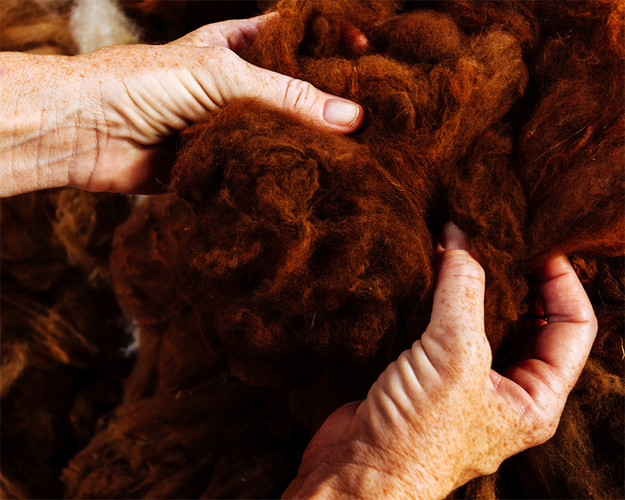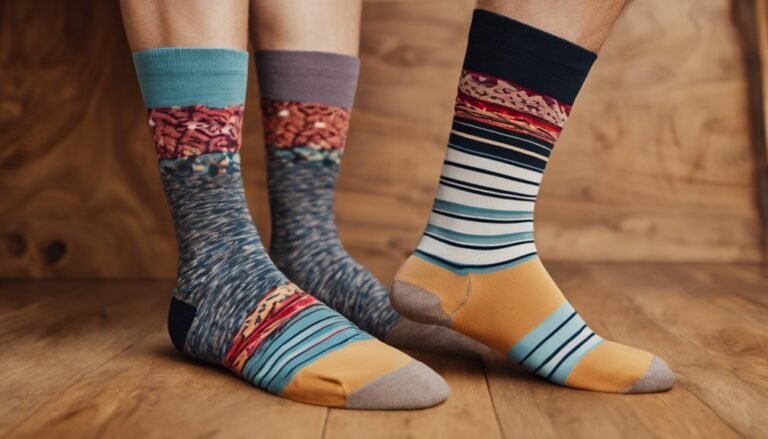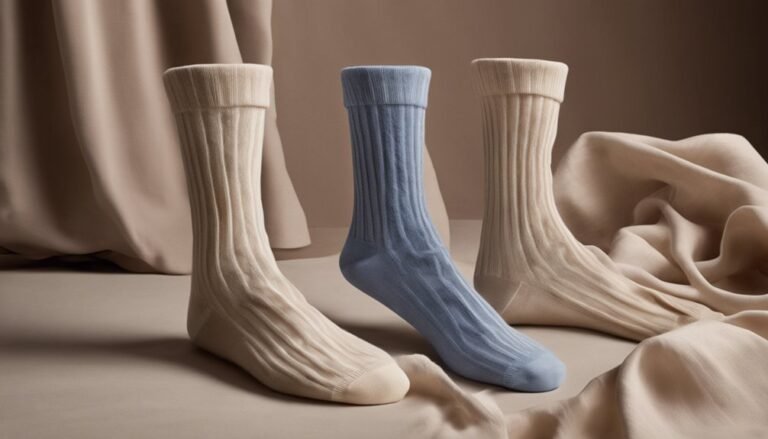Alpaca Socks Vs Merino Wool Socks: Which is Superior?
Alpaca socks and Merino wool socks are both popular choices for comfort and warmth. Each has unique features and benefits.
Comparing Alpaca socks and Merino wool socks can help you decide which is best for you. Both types offer great warmth and comfort, making them ideal for cold weather. Alpaca socks are known for their softness and hypoallergenic properties. Merino wool socks, on the other hand, are praised for their breathability and moisture-wicking abilities.
This comparison will guide you in understanding the key differences and advantages of each, helping you make an informed choice for your next pair of cozy socks. Whether you need them for outdoor adventures or everyday wear, knowing the pros and cons can lead to better comfort and satisfaction.
Material Composition
When choosing the best sock material, understanding material composition is key. Two popular materials are alpaca fiber and merino wool. Each has unique properties that make them special. Let’s explore these materials in detail.
Alpaca Fiber Properties
Alpaca fiber is known for its softness and luxurious feel. It is lightweight and hypoallergenic, making it suitable for sensitive skin. Alpaca fibers are hollow, providing excellent insulation while remaining breathable.
Alpaca socks are also durable. They resist pilling and stretching, ensuring a long-lasting product. Additionally, alpaca fiber is naturally water-resistant, keeping feet dry in damp conditions.
Merino Wool Properties
Merino wool is prized for its fine texture and comfort. It is softer than regular wool, reducing the itchiness often associated with wool products. Merino wool fibers are also elastic, offering a snug fit that retains its shape.
Merino wool has excellent moisture-wicking abilities. It absorbs and evaporates moisture quickly, keeping feet dry. Additionally, merino wool is naturally antimicrobial, preventing odor buildup and ensuring fresh socks.
| Property | Alpaca Fiber | Merino Wool |
|---|---|---|
| Softness | Very Soft | Soft |
| Hypoallergenic | Yes | No |
| Durability | High | Moderate |
| Water-Resistant | Yes | No |
| Moisture-Wicking | Moderate | High |
| Antimicrobial | Moderate | Yes |
Both alpaca and merino wool socks offer unique benefits. Understanding their properties helps in making the best choice for your needs.

Comfort And Softness
When choosing the perfect pair of socks, comfort and softness are key. Alpaca socks and Merino wool socks are popular for their unique features. Both offer a plush feel and warmth. But how do they compare in terms of comfort and softness? Let’s delve into the details.
Feel Of Alpaca Socks
Alpaca socks are known for their luxurious softness. They feel silky and smooth. Alpaca fibers are hollow, which adds to their lightweight nature. This makes them breathable and warm. Alpaca socks are also hypoallergenic. They do not irritate sensitive skin. The smooth texture provides a cozy feel. Perfect for all-day wear.
Feel Of Merino Wool Socks
Merino wool socks are equally impressive. They offer a soft and cushioned feel. Merino wool fibers are finer than regular wool. This makes them soft and non-itchy. They are also great at moisture-wicking. Keeping your feet dry and comfortable. Merino wool socks provide a snug fit. Ideal for outdoor activities or casual wear.
Both Alpaca and Merino wool socks excel in comfort and softness. Each has its unique advantages. Whether you prefer the silky feel of Alpaca or the snug fit of Merino wool, both options promise a cozy experience.
Warmth And Insulation
Choosing the right sock can make a big difference in comfort. Alpaca socks and Merino wool socks offer great warmth and insulation. Each has unique thermal properties. Let’s explore these in detail.
Thermal Properties Of Alpaca
Alpaca fibers have hollow cores. This structure traps more air. It provides better insulation. Alpaca socks are lightweight and warm. They keep your feet cozy in cold weather. Alpaca fibers also wick moisture. This helps keep your feet dry.
Thermal Properties Of Merino Wool
Merino wool fibers are fine and soft. They offer excellent thermal regulation. Merino wool socks keep your feet warm. They also breathe well. This helps prevent overheating. Merino wool can absorb moisture. It keeps your feet dry and comfortable.

Moisture-wicking Abilities
When choosing socks, moisture-wicking abilities are key. Wet feet can cause blisters and discomfort. Both alpaca and merino wool socks are known for their moisture management. Let’s look at how each performs in this area.
Alpaca’s Moisture Management
Alpaca socks excel in keeping feet dry. Alpaca fiber is less absorbent than wool. This means it repels water instead of soaking it up. As a result, alpaca socks move moisture away from the skin quickly.
Another benefit is alpaca’s breathability. The fibers allow air to circulate. This helps in keeping feet dry and comfortable. Alpaca socks are also hypoallergenic. They don’t contain lanolin, which can irritate some skin types.
Merino Wool’s Moisture Management
Merino wool is also great at moisture-wicking. It can absorb up to 30% of its weight in water. This helps keep feet dry by pulling moisture away from the skin. The wool fibers then release the moisture into the air, helping with evaporation.
Merino wool fibers are fine and soft. This makes the socks comfortable to wear. The material is also naturally odor-resistant. This means fewer smells even after a long day.
| Feature | Alpaca Socks | Merino Wool Socks |
|---|---|---|
| Moisture-Wicking | Excellent | Excellent |
| Breathability | High | Moderate |
| Hypoallergenic | Yes | No |
| Odor Resistance | Moderate | High |
Both alpaca and Merino Wool Socks offer excellent moisture-wicking abilities. The choice depends on personal preferences and needs.
Durability And Longevity
When it comes to choosing between Alpaca socks and Merino wool socks, one of the most important factors is their durability and longevity. This determines how well they withstand wear over time and how long they will last. Understanding this can help you make a more informed decision for your feet and wallet.
Wear And Tear Of Alpaca Socks
Alpaca socks are known for their incredible durability. Alpaca fibers are stronger than wool, which makes these socks less prone to holes and tears. This strength translates to a longer lifespan, even with frequent use.
These socks also have a natural resistance to pilling. Pilling occurs when fibers break and form small balls on the fabric. Minimal pilling means the socks look new for a longer time.
Alpaca socks can handle more abrasion. This makes them perfect for outdoor activities and heavy use. They retain their shape and structure, providing consistent comfort.
Wear And Tear Of Merino Wool Socks
Merino wool socks are also highly durable but in a different way. The fibers are softer and finer than Alpaca, offering exceptional comfort. However, this softness sometimes makes them more susceptible to wear and tear.
Merino wool is naturally elastic, which helps the socks maintain their form. The elasticity prevents sagging and ensures a snug fit over time. But they may not be as resistant to abrasion as Alpaca socks.
One of the advantages of Merino wool is its natural moisture-wicking properties. This keeps feet dry and reduces the risk of blisters, adding to their longevity.
| Feature | Alpaca Socks | Merino Wool Socks |
|---|---|---|
| Durability | High | Moderate |
| Resistance to Pilling | High | Moderate |
| Elasticity | Moderate | High |
| Abrasion Resistance | High | Moderate |
| Comfort | High | Very High |

Environmental Impact
When discussing the environmental impact of different types of socks, it’s important to consider the sustainability of the materials used. Two popular options are alpaca fiber and merino wool. Each has its own unique environmental footprint. This section will explore the sustainability of both types of fiber to help you make an informed choice.
Sustainability Of Alpaca Fiber
Alpaca fiber is known for its eco-friendly qualities. Alpacas have a minimal impact on their environment. They graze gently, which helps to preserve the soil. Their soft padded feet prevent soil erosion. Alpacas also consume less water than other livestock, making them a sustainable choice.
The production process of alpaca fiber is also environmentally friendly. The fiber is naturally hypoallergenic and does not require chemical treatments. This reduces the use of harmful substances. Additionally, alpaca fiber is biodegradable. It decomposes naturally, leaving no lasting waste.
Sustainability Of Merino Wool
Merino wool is another sustainable option. Merino sheep are raised in a variety of climates, which supports biodiversity. They are often raised on land not suitable for crops, which helps in land conservation. Merino wool is also a renewable resource. Sheep are shorn annually, providing a continuous supply of wool.
The production of merino wool has some environmental impacts. Sheep farming can contribute to land degradation if not managed properly. Sheep require large amounts of water and feed. However, many farms are adopting sustainable practices to minimize these effects. Merino wool is also biodegradable and recyclable, reducing its environmental footprint.
Cost And Accessibility
Choosing between alpaca socks and merino wool socks often comes down to cost and accessibility. Each type of sock offers unique benefits, but understanding their price ranges and availability can help you make an informed decision.
Price Range Of Alpaca Socks
Alpaca socks are known for their luxurious feel and warmth. They tend to be on the pricier side due to their high-quality fibers. Here’s a breakdown of the typical price range:
- Basic Alpaca Socks: $20 – $30 per pair
- Mid-range Alpaca Socks: $30 – $50 per pair
- Premium Alpaca Socks: $50 and up per pair
Alpaca socks are often considered a luxury item. They are less commonly found in local stores. Online retailers and specialty boutiques usually stock them.
Price Range Of Merino Wool Socks
Merino wool socks are also highly regarded for their comfort and moisture-wicking properties. Their price range is generally more accessible compared to alpaca socks:
- Basic Merino Wool Socks: $10 – $20 per pair
- Mid-range Merino Wool Socks: $20 – $35 per pair
- Premium Merino Wool Socks: $35 and up per pair
Merino wool socks are widely available in many retail stores and online. They offer a more affordable option without compromising on quality.
| Type of Socks | Basic Price Range | Mid-range Price | Premium Price | Availability |
|---|---|---|---|---|
| Alpaca Socks | $20 – $30 | $30 – $50 | $50 and up | Specialty Boutiques, Online |
| Merino Wool Socks | $10 – $20 | $20 – $35 | $35 and up | Retail Stores, Online |
Frequently Asked Questions
Which Is Better Merino Wool Or Alpaca Wool?
Merino wool is softer and more breathable, ideal for sensitive skin. Alpaca wool is warmer and more durable, perfect for cold climates.
Are Alpaca Or Wool Socks Better?
Alpaca socks offer better warmth, moisture-wicking, and hypoallergenic properties. Wool socks provide good insulation and durability. Choose based on your needs.
Can You Machine Wash Alpaca Socks?
Machine washing alpaca socks is not recommended. Hand wash in cold water with mild detergent to maintain quality.
Is Alpaca Actually Warmer Than Wool?
Yes, alpaca is warmer than wool. Alpaca fibers have better insulation, making them ideal for cold weather. They are also lighter and softer.
Conclusion
Choosing between alpaca socks and merino wool socks depends on your needs. Alpaca socks offer warmth and softness, perfect for cold days. Merino wool socks provide great moisture-wicking, keeping feet dry. Both types are comfortable and durable. Consider your activities and climate.
For extreme cold, alpaca is a winner. For active lifestyles, merino wool excels. Evaluate your preferences and select the best fit for you. Both options promise comfort and quality. Enjoy happy, cozy feet!






